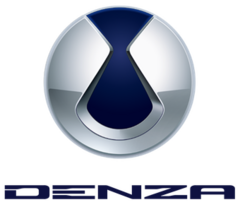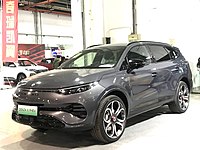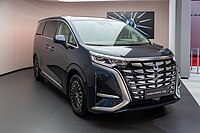
The Mercedes-Benz Group AG is a German multinational automotive corporation headquartered in Stuttgart, Baden-Württemberg, Germany. It is one of the world's leading car manufacturers. Daimler-Benz was formed with the merger of Benz & Cie., the world's oldest car company, and Daimler Motoren Gesellschaft in 1926. The company was renamed DaimlerChrysler upon the acquisition of American automobile manufacturer Chrysler Corporation in 1998, and was again renamed Daimler AG upon divestment of Chrysler in 2007. In 2021, Daimler AG was the second-largest German automaker and the sixth-largest worldwide by production. In February 2022, Daimler was renamed Mercedes-Benz Group as part of a transaction that spun-off its commercial vehicle segment as an independent company, Daimler Truck.
BYD Auto Co., Ltd. is the automotive subsidiary of BYD Company Limited, a publicly listed Chinese multinational manufacturing company. It manufactures passenger battery electric vehicles (BEVs) and plug-in hybrid electric vehicles (PHEVs), collectively known as new energy vehicles (NEVs) in China. It also produces electric buses and trucks.
China (Guangzhou) International Automobile Exhibition, also called Guangzhou International Motor Show or Auto Guangzhou, is an auto show held by Guangzhou Zhanlian Exhibition Service Co., Ltd, in November and December every year in the Guangzhou International Convention and Exhibition Center, China. It is not a recognized international show by the Organisation Internationale des Constructeurs d'Automobiles.
Beijing International Automotive Exhibition, Beijing Motor Show or Auto China is an auto show held biennially in Beijing, China since 1990. China is currently the largest auto market in the world.
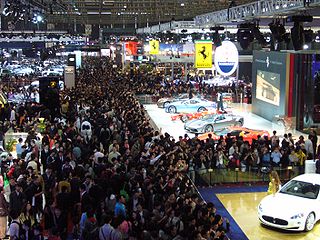
Auto Shanghai, officially known as the Shanghai International Automobile Industry Exhibition, is a biennial international automobile show that alternates with the Beijing Auto Show as China's yearly international automotive exhibition. First held in 1985, Auto Shanghai is the nation's oldest auto exhibition, and is considered as an important major international auto show.
Mercedes-Benz, commonly referred to as Mercedes and sometimes as Benz, is a German luxury and commercial vehicle automotive brand established in 1926. Mercedes-Benz AG is headquartered in Stuttgart, Baden-Württemberg, Germany. Mercedes-Benz AG produces consumer luxury vehicles and light commercial vehicles badged as Mercedes-Benz. From November 2019 onwards, Mercedes-Benz-badged heavy commercial vehicles are managed by Daimler Truck, a former part of the Mercedes-Benz Group turned into an independent company in late 2021. In 2018, Mercedes-Benz was the largest brand of premium vehicles in the world, having sold 2.31 million passenger cars.

Beijing Automotive Group Co., Ltd. (BAIC) is a Chinese state-owned automobile manufacturer headquartered in Shunyi, Beijing. Founded in 1958, it is the sixth largest automobile manufacturer in China, with 1.723 million sales in 2021.

The Mercedes-Benz GLC is a compact luxury crossover SUV introduced in 2015 for the 2016 model year that replaced the GLK-Class. According to Mercedes-Benz, it is the SUV equivalent to the C-Class.
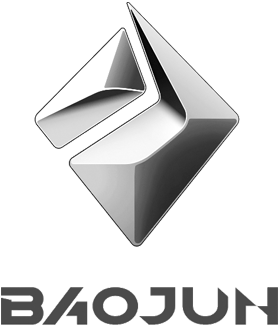
Baojun is a Chinese automobile marque owned by a joint venture of General Motors and SAIC Motor, SAIC-GM-Wuling Automobile.
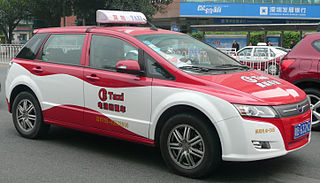
The electric vehicle industry in China is the largest in the world, accounting for around 57.4% of global production of electric vehicles (EVs) and around 500,000 exports in 2021. In 2021, CAAM reported China had sold 3.34 million passenger electric vehicles, consisting 2.73 million BEVs and 0.6 million PHEV, which is around 53% share of the global market of 6.23 million "new energy" passenger vehicles – BEVs, PHEVs, and HEVs. China also dominates the plug-in electric bus and light commercial vehicle market, reaching over 500,000 buses and 247,500 electric commercial vehicles in 2019, and recording new sales of 186,000 commercial EVs in 2021.

The BYD Qin is a compact sedan produced by BYD Auto since 2012. The Qin started out as the plug-in hybrid version of the BYD Surui, and was introduced in the Chinese market in August 2012. Currently, the Qin is available as a plug-in hybrid (PHEV), battery electric vehicle (BEV), and previously an internal combustion engine (ICE) vehicle.

Mercedes-EQ is a series of battery electric vehicles manufactured by Mercedes-Benz. The first model was previewed at the Paris Motor Show in 2016 with the Generation EQ concept vehicle. Mercedes-Benz intends to produce ten EQ models by 2022, three of which will have the Smart brand, representing between 15% and 25% of the company's global sales. All of Mercedes-Benz electric vehicle design and production efforts will target the EQ family.

The Denza EV, Denza 400 and the Denza 500 are different names of a Chinese electric car produced by Denza, an joint venture between Daimler AG and partner BYD Auto.

The Denza N8 and the preceding Denza X are plug-in hybrid and battery electric mid-size crossover SUVs. The original Denza X was first launched in Guangzhou Auto Show 2019 by Denza, originally a joint venture between Chinese automaker BYD Auto and German luxury car brand Mercedes-Benz.

Voyah is the luxury division of Chinese state-owned automaker Dongfeng Motor Corporation, specializing in designing and developing electric vehicles, Voyah was founded in April 2019.

The Denza D9 is a battery electric and plug-in hybrid minivan produced by Denza since 2022. The D9 was launched on the Chinese market in May 2022 as first of three new Denza models for 2022.
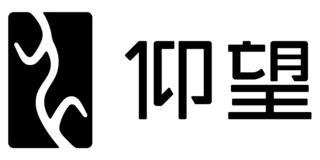
Yangwang Auto is a Chinese luxury electric car brand owned by BYD Auto and marketed by Shenzhen Yangwang Auto Sales Co., Ltd. The brand was introduced in January 2023. In the Chinese market, Yangwang vehicles occupies the price range above CN¥1 million, competing with European luxury brands. As of 2024, Yangwang is positioned above two other BYD sub-brands, Denza and Fangchengbao.
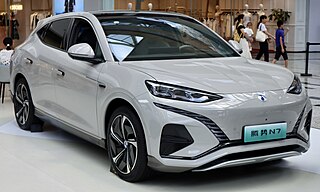
The Denza N7 is a battery electric mid-size crossover SUV produced by Denza, a joint venture between Chinese manufacturer BYD Auto and Mercedes-Benz AG. The N7 was officially launched in the Chinese market in July 2023.

Fangchengbao, also spelled Fang Cheng Bao and trademarked in English as Formula Bao is a Chinese luxury electric car brand owned by BYD Auto and marketed by Shenzhen Fangchengbao Auto Sales Co., Ltd. The brand was introduced in June 2023, and mainly produces performance-oriented SUVs aimed at the off-road and track-focused segments. The brand operates its own direct sales stores, in contrast with BYD that relies on a dealership network.
